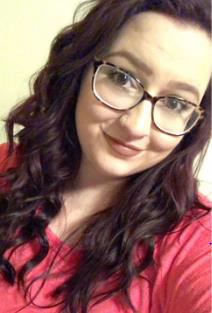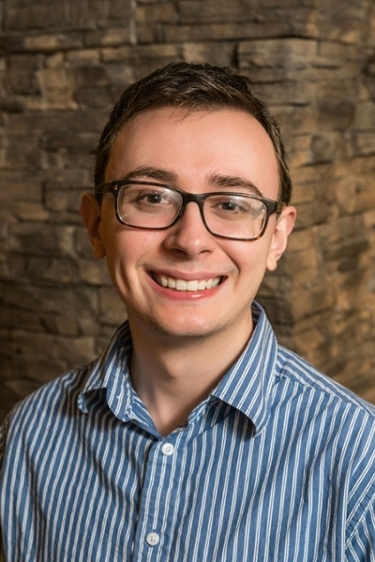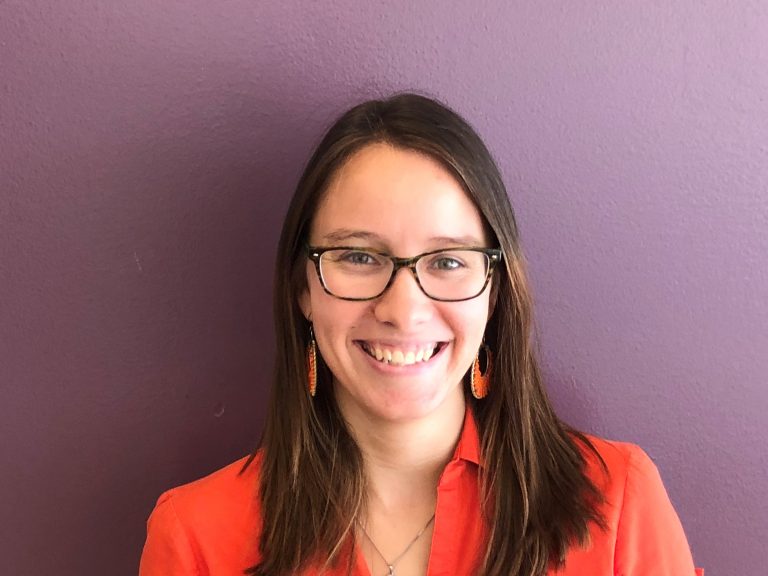Spotlight-BASW Graduate
Emily Dicola
 Emily currently works at Lancaster Health Center as the Social Worker at their Water Street location. Her responsibilities include assisting those with whom she works obtain health insurance (Medicaid, Medicare, or Marketplace), assisting with the application and enrollment process. Additionally, Emily connects patients experiencing homelessness to services such as housing assistance. The level of help that Emily provides to the patients depends on their current abilities. Emily empowers her patients to build upon their skills to be successful on their own.
Emily currently works at Lancaster Health Center as the Social Worker at their Water Street location. Her responsibilities include assisting those with whom she works obtain health insurance (Medicaid, Medicare, or Marketplace), assisting with the application and enrollment process. Additionally, Emily connects patients experiencing homelessness to services such as housing assistance. The level of help that Emily provides to the patients depends on their current abilities. Emily empowers her patients to build upon their skills to be successful on their own.
When talking about her experience at Millersville University in the BASW Program, Emily says, “the program taught me how to look at issues and patients on every level and try to assess situations from their perspective. I frequently have to assess how their environment, upbringing and culture have an impact on their decisions and how they are currently living their lives.” Through her years at Millersville, Emily has learned how to work collaboratively and how to effectively communicate with patients and coworkers.
In her work, she also utilizes all 3 levels of social work practice. Micro practices in her job include working directly with our patients. She practices mezzo skills while she works with their care teams and the community resources. Macro skills come into play when she advocates for her patients to local government. Emily is grateful for her well-rounded education at Millersville. She says, “the generalist degree gave me base knowledge of all 3 levels, and I have been able to mesh skills from each level of practice to help our patients as best as possible.”
James Roussel
 My title at the Emerald Foundation is Esports Program Coordinator. My goal in this position is to implement the NASEF (North American Scholastic Esports Federation) program in schools and community organizations by providing technical and administrative support while engaging in public advocacy. As an employee of the Emerald Foundation I aim to follow both the mission of the Emerald Foundation and the NASEF program which both coincide with each other. The Emerald Foundation strives to build a thriving community by focusing on the areas of youth, education, and healthcare. This is accomplished by providing rental subsidies and collaborative programming opportunities for non-profits, developing programming to fill unmet community needs and offering opportunities for diverse citizens to meet and learn from one another. With a heavy focus on the youth and education aspect; NASEF’s mission is to provide opportunities for all students to use esports as a platform to acquire critical communication, collaboration, and problem-solving skills needed to thrive in work and in life. My primary responsibility in this mission is serving as the local NASEF program contact for each participating clubs’ general manager.
My title at the Emerald Foundation is Esports Program Coordinator. My goal in this position is to implement the NASEF (North American Scholastic Esports Federation) program in schools and community organizations by providing technical and administrative support while engaging in public advocacy. As an employee of the Emerald Foundation I aim to follow both the mission of the Emerald Foundation and the NASEF program which both coincide with each other. The Emerald Foundation strives to build a thriving community by focusing on the areas of youth, education, and healthcare. This is accomplished by providing rental subsidies and collaborative programming opportunities for non-profits, developing programming to fill unmet community needs and offering opportunities for diverse citizens to meet and learn from one another. With a heavy focus on the youth and education aspect; NASEF’s mission is to provide opportunities for all students to use esports as a platform to acquire critical communication, collaboration, and problem-solving skills needed to thrive in work and in life. My primary responsibility in this mission is serving as the local NASEF program contact for each participating clubs’ general manager.
This primarily involves guiding them through the club activation process, serving as an advocate for them and making sure they have access to all the resources they need to grow. In the area of NASEF specific activities I manage livestreaming and recording of both local and regional esports events, the organization of regional tournaments, and making sure each club is running smoothly and effectively. A great deal of my time is dedicated to getting schools on board for the program. I spend my time meeting with school professionals, local organizations, and key figures within the community to advocate for the program and dispel some of the myths associated with video games and learning.
As exciting as it is to be a part of all of this, I still have a great deal to learn. I have only been in this position since February 4, 2019 and I still need to learn more about how I can shape this position to best promote the growth of the program and the academic success of the students involved. Since I am so new I am very thankful to have such skilled and compassionate co-workers at the Emerald Foundation as well as those associated with NASEF. One of the most rewarding parts about my job is seeing how much responsibility the student’s in each club take to make the program their own. Given the free-form structure of the program; students are given incentive to create their own opportunities outside of the ones we establish for them such as our seasonal tournaments and coaching sessions. Students have taken it upon themselves to design apparel for their esports team, meet with school faculty to explain the significance of their club, and established an online presence through social media to campaign and promote their club. Seeing this initiative take place around an activity that students are so excited about is wonderful to see.
My education has impacted my strategy for this project in a big way. My viewpoint and the viewpoint I share with my co-workers is that this program can work in a variety of ways to bridge gaps between students who do not participate in traditional sports or the performing arts. Students are learning a variety of skills from playing video games such as problem solving, teamwork, data analysis, and scientific reasoning. This program gives them an opportunity to contextualize those skills in a safe and structured environment that not only promotes their personal growth, but also their potential for career exploration. It is for these reasons that I believe this program is perfect for addressing the growing educational stagnation we as a nation are experiencing and for addressing the low graduation rate our local schools are experiencing. Having studied social work I can certainly say that the knowledge I have gathered and experiences I have shared in this department greatly contribute to my own growth as an advocate and my work as an agent of empowerment.
AMANDA REILLY

Two months after I graduated from Millersville University in 2012 with my Bachelor’s in social work, I moved to Philadelphia and started working for the Arch Diocese of Philadelphia as a case manager. I worked at a home for women with a history of homelessness and mental health issues for almost two years, where I learned a lot about life, about how mental health can impact someone’s entire life, and even about the effects of taking psychotropic medications long-term. At this home, I went from being someone who knew a lot about social work, to discerning what it meant for me to be a social worker, especially one who was often in the midst ethical dilemmas. (I discovered that it’s much easier to discuss them in the classroom than experience them in the workplace.)
Most recently, I finally decided that maybe direct social service was not the best fit for me and began looking for other opportunities. Now, I’m happy to say that I’ve found employment with a solid organization called the Southwest Organizing Project, otherwise known as SWOP, which is located in the southwest side of Chicago. Employed as a community organizer with SWOP, I work alongside my colleagues to fight injustices that impact primarily the local community members in Chicago, but in some cases, affect even all residents of the state of Illinois.
Currently, I am collaborating with organizers, educators, and other professionals on two important projects. Within one campaign called the Reclaiming the Southwest Campaign, or “Reclamando el Suroeste de Chicago,” I am working on a long-standing campaign that toils endlessly to “reclaim” the local neighborhoods that were devastated by the foreclosure crisis of the 2000s. Through a process of joining forces with our community members, local institutions, and even partners with private market investors, SWOP has been able to help 600 families avoid foreclosure, and has also purchased and restored many once-vacant properties. These properties are sold below market-value rate (at a loss to SWOP) to local community members seeking to become first-time home buyers and are connected with financial assistance.
I’m also a part of a newer project at SWOP which seeks to create a “System of Care,” that will connect local non-profits with Chicago schools, to bring increased access to mental health and behavioral health services to families in southwest Chicago. This undertaking is not simply about creating access to health care for children and youth but is also about building relationships in the community, which in turn also builds our power as an organization. The ultimate goal of our “System of Care,” is that every student will be able to utilize the system in some way, whether that is a connection with mental health providers or access to leadership training. Part of my role is researching existing “systems of care,” across the country and continuing conversations with our stakeholders (partner institutions and schools) about what they would like to see happen next in our planning process.
Although I didn’t learn how to handle each specific role I have had since my graduation from the social work program at Millersville University, I learned skills that I needed- and still need to utilize every day. Through my coursework and internships at Millersville, I obtained a groundwork and understanding of how to relate to people from different walks of life, gained an appreciation for the values of social work, and also improved my technical skills (writing, research, etc.). Although these are only a few examples of how I have benefited from Millersville’s social work program, I would recommend for any young professional in any humanities field to keep writing and reflecting about where you see yourself in the field. Even if you don’t find the “right fit” the first, second, or third time around, challenge yourself to think bigger, and you’ll find it.